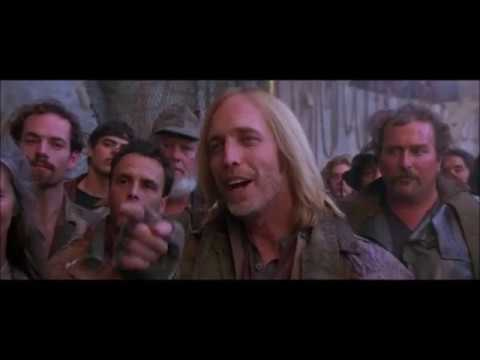Tell me a story about the end of the world.
On why I enjoy apocalyptic fiction, even when it seems too real.
I can’t get enough of the end of the world.
There are two genres of popular fiction that I’m an absolute sucker for: I love stories involving time travel, and I love stories involving the apocalypse. In recent years, I have become somewhat begrudgingly accepting of the fact that the former is likely impossible, whereas the latter seems more and more possible every day. Despite the flood of bad news that seems to bear down on us from all sides twenty-four hours a day, I’ll still devour a book or movie that shows what things would be like if the news were even worse.
These stories come in many forms. They can be razor-sharp and unrelentingly dark narratives, like Cormac McCarthy’s The Road, a story of a man and his young son traveling through a world whose skies have been blackened and cities reduced to ash by an unspecified cataclysm. (The Road is a first-ballot Hall-of-Famer in the category of “books I absolutely loved and will never read a second time.”) They can nestle in the empty hollows of the aftermath, like Emily St. John Mandel’s superb and haunting Station Eleven, which follows a roving Shakespearean theatre troupe traveling between sparsely populated towns years after a fast-moving pandemic killed 99% of the world’s population. They might be fantastical allegories, like N.K. Jemisin’s epic, sprawling Broken Earth trilogy, set in a far-off future where the Earth itself has turned on its inhabitants and unleashes generations-long “seasons” of destruction. They might simply be a quiet meditation on a slowly-dawning yet unstoppable end, like Nevil Shute’s 1957 novel On The Beach, a scientifically-incorrect-by-modern-understanding but nonetheless-stirring story of the last people still alive on Earth after a nuclear winter, awaiting the eventual arrival of their own demise in the form of a radiation cloud.
There’s a million ways to tell the story of the end of the world, and I’ll happily consume them all.
Heck, they don’t even necessarily have to be good.
The 1997 Kevin Costner vehicle The Postman is set in a dystopian version of the year 2013, where wars and plagues have caused society to revert to a pre-technological state. People live in crude walled cities and ride on horseback. There is almost no communication between settlements, and militias dominate the wide-open spaces between. There is little hope, until a roving outsider with a mailbag begins spreading rumors of a new national government being formed. The movie is three hours long, lost $60M at the box office, currently holds a well-deserved 8% rating on Rotten Tomatoes, and features one of the most inexplicable and hilarious cameos of all time in rock legend Tom Petty playing a post-apocalyptic Tom Petty. While Costner’s previous post-apocalyptic effort Waterworld received more attention as a big-budget flop, it is a critical and commercial mega-hit in comparison to The Postman.
I have seen The Postman many times, and own it on DVD.
Why do I do this to myself? I don’t wish for the end times. I am, generally speaking, a happy person with a good, comfortable life. Why would I spend so much time immersing myself in stories of the world gone away? Perhaps it’s because they’re important reminders.
The things that have to happen every day for a modern society to function are miraculous when you take them as a whole, an impossible choreography of people playing countless parts, acting in roles initiated long before anyone alive today was ever born. We take these things for granted in the first world: our belief that the lights will turn on and the taps will flow and that there will always be a clear way from Point A to Point B. It’s a fabric that’s both tightly-woven and impossibly thin, and every day something threatens to tear a hole in it. Financial collapse. Bull-headed posturing between leaders with more weapons than sense. Climate change rising the seas and burning the forests. Global pandemic. The Cleveland Browns winning 10 games and breaking the Seventh Seal.
The careless belief that society can survive any of our abuse or neglect or degradation has gotten us here. The belief that we deserve to live in a thriving democracy by mere provenance and not through the hard work of collective self-governance. The belief that our actions have never had consequences before, so there’s no reason to believe that they will now. The belief that we can drive society like a rented golf cart and count on the kid in the clubhouse to fish it out of the water hazard while we’re having a laugh at the bar.
Apocalyptic fiction is, perversely, a reminder that society should not be taken for granted. It should be appreciated as a wonder and cared for with both tremendous caution and enthusiastic zeal. It’s a reminder that every day we should labor at keeping those fragile threads together, and that it will take more than empty platitudes and good feelings to do so. We should know that things could be much worse, but also believe that they can be much better if we’re willing to work for it.
But if that doomsday future does come to pass, I hope Tom Petty is there. Bridge City seemed alright.
— Scott Hines (@actioncookbook)
(P.S. you should read my own piece of apocalyptic fiction from several years ago.)



You MUST read the Ben H Winters "Last Policeman" series- about a cop at the end of the world in New Hampshire. MUST MUST MUST.
Have you tried “Infomocracy” or “FKAUSA”? Less serious but both interesting